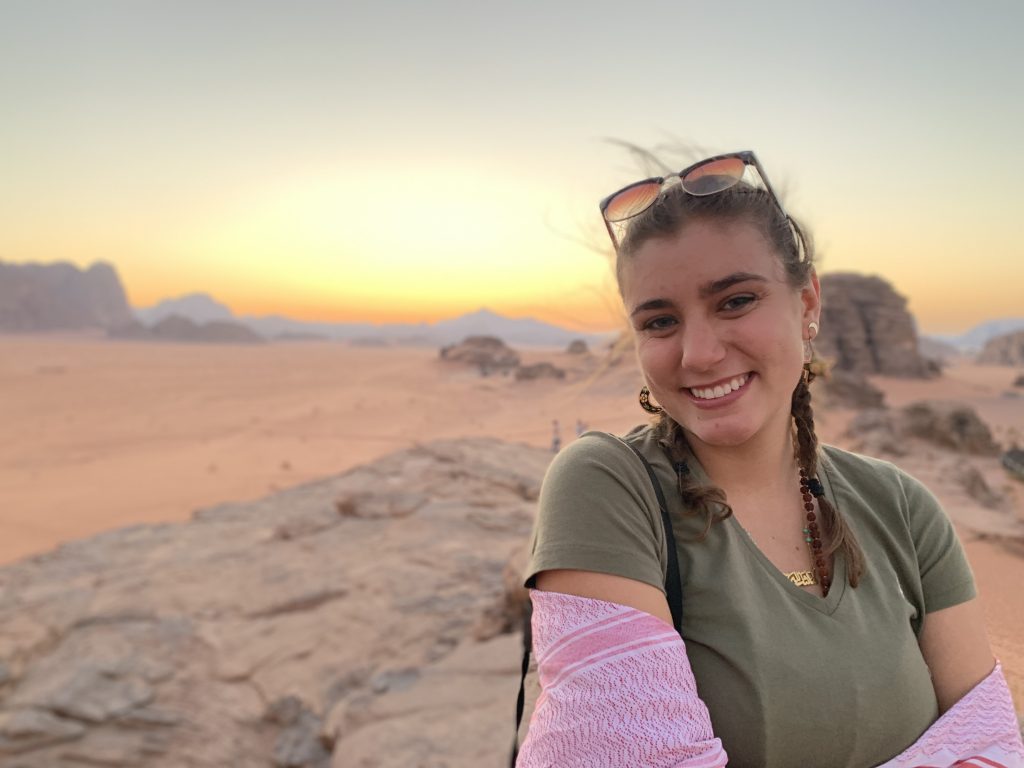SIT’s virtual Arabic language program brought Jordan to Jacqueline Bengston
July 7th, 2021 | SIT Study Abroad

Jacqueline Bengtson is a senior at Rollins College in Winter Park, Florida, majoring in anthropology and religious studies. She participated in SIT Study Abroad’s intensive Arabic language summer program in Jordan 2019 and lived with a local family in Amman for two months. In 2020, with the COVID-19 pandemic prohibiting travel, Bengtson returned to SIT for advanced language instruction but this time online with the virtual Arabic language program. She was one of 38 students enrolled in online language classes requiring 15 hours of academic work a week (including a three-hour synchronous class, homework, and other asynchronous assignments) over nine weeks. It wasn’t her first virtual SIT experience ; the summer before she participated in the Netherlands: Virtual Internship in Sexuality, Gender & Non-Government Organizations. We recently caught up with Jacqueline to find out what it was like to study Modern Standard Arabic remotely, how class time was structured and whether virtual learning kept her connected to the culture.
Why did you decide to study Arabic?
When I came to Rollins, I felt like I didn’t know much about the Middle East. As an anthropology major, I thought the best way to understand people, their culture, and religion is through language. After my first Arabic class I fell in love.
How did online learning compare to your in-country language program with SIT?
It’s difficult to compare because in Jordan I was living with a homestay family, and I was going to class every day and practicing Arabic every second of every day. It wasn’t just a structured three-hour period. But the online program was fun because we spent those three hours speaking in Arabic as much as we could in that time.
Why did you take the virtual Arabic program with SIT in fall 2020?
Unfortunately, Arabic at Rollins is a very small program and with COVID there were a lot of budget cuts, and the Arabic program was cut. I didn’t want to go a semester without studying Arabic, so I studied virtually with SIT in the fall of 2020. I studied with Riham Al-Naimat, who was a language instructor I knew in Jordan. I was supposed to be back studying in Jordan in the spring but alas with COVID I could not.

Tell me about the virtual class. How many hours a week were you online? How many others were studying Arabic with you?
We met once a week online on Sundays for three hours over nine weeks and had about seven to ten hours of homework a week. The semester Arabic program had five students. I was placed in the advanced class with another student. There was also a low-intermediate class for one student and a high-intermediate class for another student and then a beginner class for a fifth student. Riham was very generous with her time and instruction.
How was your class structured?
We’d spend the first 30 minutes speaking only in Arabic and talking about our week and asking each other questions. Then we’d go over our homework, which may have been a translation or writing up our own report on something. Then we’d have a grammar lesson for about an hour or review any grammar we didn’t understand. We’d have a 15-minute break during the three hours, and we’d finish up with some kind of vocabulary or a grammar game. Our teacher always kept it fun and lively.
Was class time your only live interaction in Arabic during the week?
We met for three hours over Webex and during the week we’d have homework and assignments. If the other advanced student and I were confused about something we’d text each other but Riham was also available to go over questions or for private tutoring, which I utilized a lot. Even though it was all online it felt very personal. I keep in touch with my homestay family and practiced speaking with them too which was fun. It brought Jordan to me.
What did the class focus on most: conversation, reading, writing, or grammar?
The emphasis is really on all of it. It’s a lot harder to practice speaking and conversing because it’s virtual. It’s not something I was practicing everyday like I was in Jordan but within class we tried to make it very comprehensive, speaking-heavy but then grammar was also a very big part. We were at a level where we could dive into translation and writing essays, which is something that at an advanced level I hadn’t done in previous classes. It introduced new ways of learning a language.
Did you have a favorite activity or assignment?
I really enjoyed writing essays in Arabic. You have to think in Arabic. It filtered everything that I had been learning for the past three years into a written piece. I was able to convey what I wanted to convey in another language and when we went over it in class I did pretty well. Writing a mini paper in Arabic was very fulfilling.
Did anything surprise you about learning virtually?
Of course, I wanted to be learning in person. But I was honestly so grateful that I was able to participate in SIT’s virtual Arabic program. It was very comforting to be able to learn online. I felt like having this opportunity was a blessing. Like I said before, it gave me the opportunity to bring Jordan to me. When we were in those virtual classes with Riham it made me feel like I was back in the culture at least for a little bit.
Would you recommend the virtual program to a beginner?
You have to start somewhere. It doesn’t matter if you’re beginning, and you don’t know any words at all. If you put in as much effort as the instructors put into teaching and utilize their help as well, you learn a lot faster than you realize. Even though I’m advanced in Arabic, my favorite part of learning languages is starting to learn a language. It’s so exciting and new. People are so much more open to sharing their culture with you when you’re learning their language.
Check out SIT’s virtual language programs for Fall 2021 and Spring 2022:
Fall 2021
Apply by August 1, 2021
- Chile: Virtual Spanish Language (Intermediate & Advanced)
- India: Virtual Hindi Language (Beginning & Intermediate)
- Indonesia: Virtual Bahasa Indonesia Language (Beginning & Intermediate)
- Jordan: Virtual Arabic Language (All Levels)
- Nepal: Virtual Nepali Language (Beginner & Intermediate)
- Nepal: Virtual Tibetan Language (All Levels)
- Peru: Virtual Quechua Language (Beginner)
- Senegal: Virtual French Language (Intermediate & Advanced)
- Vietnam: Virtual Vietnamese Language (Beginning & Intermediate)
Spring 2022
